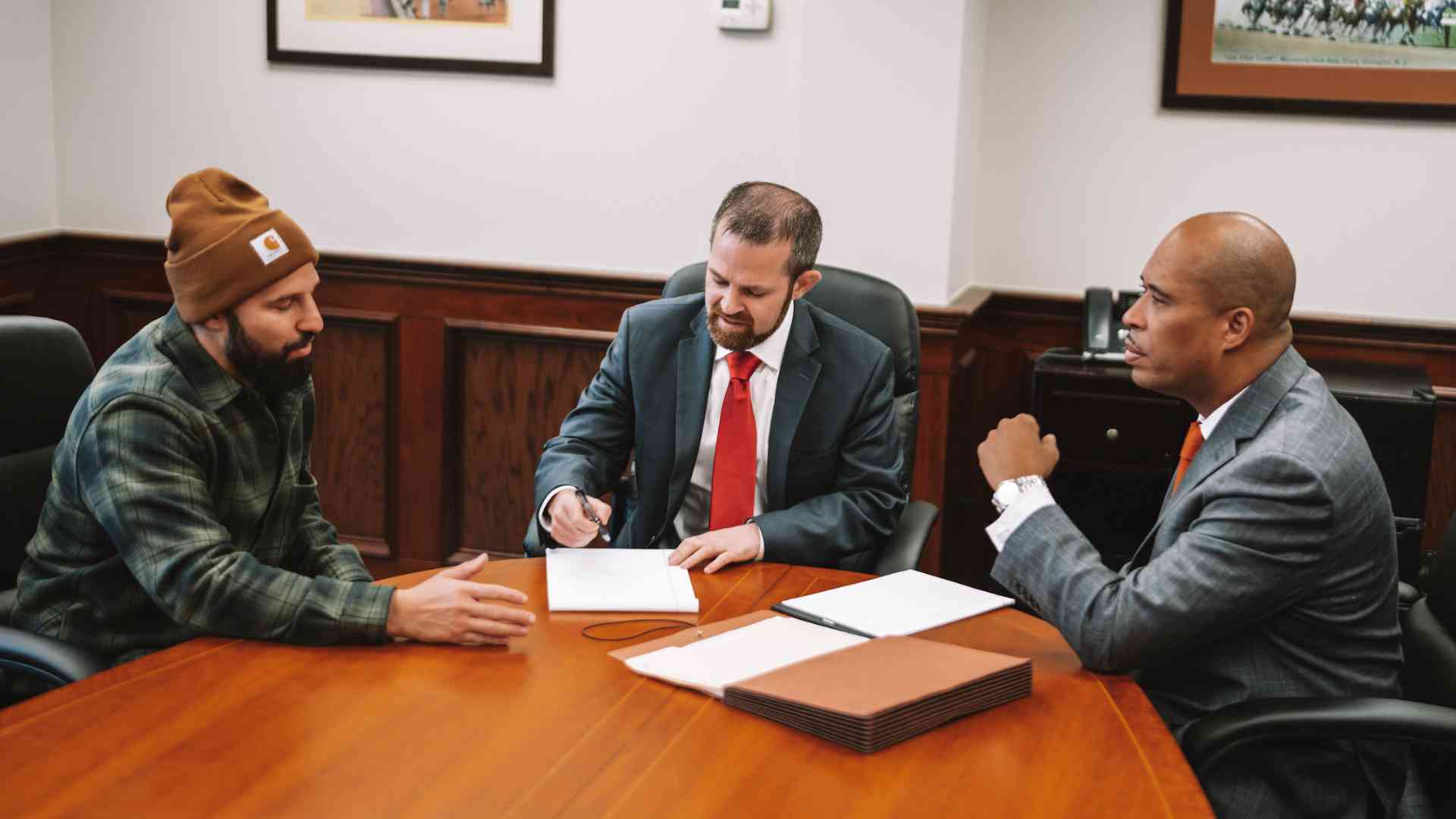When you face a legal issue, getting a lawyer’s advice is a key first step. A legal advice session lets you talk about your situation with a lawyer. This is your chance to learn about your options.
At your meeting, you can share the details of your case and ask questions. The lawyer will look at your situation and share their thoughts. They will use their knowledge and experience to help you.
To get the most out of your meeting, prepare well. Bring important documents and write down your questions. Knowing what to expect helps you make the most of your time with the lawyer.
Preparing for Your Lawyer Consultation
Getting ready for a lawyer meeting is key to a successful session. By preparing well, you can make the most of your time with the attorney. This increases your chances of a good outcome for your case.
Gather Relevant Documents
Gathering all important documents is a must. This includes contracts, police reports, and medical records. Having these documents ready lets the lawyer quickly understand your case. This helps them give you better advice.
Write Down Your Questions
Write down your questions before the meeting. This way, you won’t forget to ask them. Ask about their experience, legal strategies, and how long your case might take.
Dress Appropriately
Dressing right shows respect and professionalism. Choose neat, presentable clothes. It shows you value the attorney’s time and expertise. By following these tips, you’ll have a more productive meeting with your lawyer. Being well-prepared helps your lawyer help you better.
📞 Have questions about your legal matter?
Understanding the Purpose of a Legal Consultation
When you face a legal issue, getting advice from a qualified lawyer is key. The first step is the initial consultation with an attorney. Here, you can share your case and get advice that fits your situation. The main aim of a legal consultation is to check if your case has merit and look at your options. Your lawyer will listen to your story, ask questions, and understand the legal side of things. They will then explain your rights, talk about possible outcomes, and suggest the best next steps. This meeting is also a chance to see if the lawyer is right for you. Ask about their experience, how they communicate, and their availability. A good relationship with your lawyer is vital for a positive outcome. Remember, a legal consultation is just to explore and doesn’t mean you have to hire the lawyer. It’s to get information, look at your options, and decide what to do next. By knowing what a legal consultation is for, you can make the most of this important meeting.
What to Expect During a Consultation with a Lawyer
When you meet with a lawyer, expect a professional and informative talk about your legal issue. This meeting is a chance to see if you and the lawyer can work well together. You’ll get to share your case and get valuable advice from a legal expert.
Introducing Yourself and Your Case
Start by introducing yourself and explaining your legal issue. Share a brief summary of your situation, including important facts and timelines. The lawyer will listen carefully and might ask questions to understand your case better.
Answering the Lawyer’s Questions
The lawyer will ask you questions to learn more about your case. They might ask about the events leading up to your issue, any steps you’ve taken, and what you hope to achieve. It’s important to answer these questions honestly and fully. This helps the lawyer understand your case and give you the best advice. Remember, what you say is protected by attorney-client privilege, so you can speak openly.
Discussing Legal Options and Strategies
Once the lawyer understands your case, they’ll talk about your legal options and strategies. They’ll share insights on your case’s strengths and weaknesses, and what outcomes and costs you might face. This is a great time to ask questions and get clarity on your case. The lawyer’s knowledge and experience can help you make informed decisions about your legal matter.
Questions to Ask During Your Lawyer Consultation
When you meet with a lawyer, it’s key to be ready with questions. This helps you understand their experience, how they communicate, and their fees. It’s important to know if they’re the right lawyer for your case. Here are some essential questions to ask.
Experience and Expertise
First, ask about their experience with cases like yours. Ask about their success stories, notable cases, and any special training. This shows if they have the skills to help you.
Communication and Availability
Good communication is vital. Ask how they communicate and how often you’ll get updates. Find out their preferred methods and how fast they respond. Choose a lawyer who is easy to reach and keeps you informed.
Fees and Payment Structure
It’s important to discuss fees and payment plans. Ask if they charge by the hour, a flat fee, or if they work on contingency. Also, ask about extra costs like filing fees or travel expenses. Knowing the costs helps you budget and avoid surprises.
Get prepared and meet with one of our experienced personal injury lawyers. Schedule your free consultation now.
The Role of Confidentiality in a Legal Consultation
When you meet with a lawyer, understanding confidentiality is key. Attorney-client privilege keeps your talks with your lawyer private. This rule covers all your conversations, whether face-to-face, by phone, or in writing. This confidentiality lets you talk freely with your lawyer. You don’t have to worry about your words being used against you. This trust is vital for a strong lawyer-client bond. It helps your lawyer give you the best advice and defend you well.
There are times when confidentiality cannot be maintained. For instance, if you inform your lawyer about a future crime you plan to commit, this falls outside the scope of attorney-client privilege. Additionally, if a court orders the release of information, your lawyer may be required to share it. Generally, however, your lawyer is obligated to keep your conversations private.
Your lawyer will talk about attorney-client privilege and why keeping things private is important. This talk makes you feel safe sharing personal details. It also starts a strong, trusting relationship with your lawyer.
Understanding the Attorney-Client Relationship
When you talk to a lawyer, it’s key to know about the attorney-client relationship. This bond is based on trust, clear communication, and working together to reach your legal goals. A strong relationship with your lawyer is vital for your case’s success.
Establishing Trust and Rapport
A good attorney-client relationship starts with trust and rapport. Pay close attention to how your lawyer talks to you during your meeting. Do they really listen to what you say? Do you feel safe sharing private details with them? Trust and rapport are key for a good working relationship. Your lawyer should be someone you trust completely. You’ll need to share personal and sensitive information about your situation. If you don’t feel comfortable with your lawyer, it might be time to look elsewhere.
Setting Expectations and Goals
It’s also important to set clear expectations and goals with your lawyer. Talk about what you want to happen, when you want it to happen, and any worries you have. Make sure your lawyer knows what’s most important to you and is ready to help you achieve it. Be realistic about what your lawyer can do and what your case might result in. A good lawyer will give you a straight view of your situation and the challenges ahead. Even though your lawyer should be caring and supportive, remember this is a professional relationship. Their main job is to give you legal advice and defend you, while keeping professional boundaries.
💡 Need legal advice?

Discussing Legal Fees and Costs
When you meet with a lawyer, it’s important to know about the costs. Talk about how they charge and any extra fees during your first meeting. Knowing this helps you choose the right lawyer for your case.
Hourly Rates vs. Flat Fees
Lawyers charge in two ways: by the hour or a flat fee. Hourly rates depend on the time spent on your case. Flat fees are a set price for certain services. Ask your lawyer which method they prefer and why it’s best for your case. Keep in mind, complex cases need more time and money. This can affect how much you’ll pay for legal help.
Retainer Agreements
Some lawyers ask for a retainer fee before starting work. A retainer is a payment that covers future legal services. Ask about their retainer policy, including the amount and how it’s used. It’s key to understand how the retainer is used and replenished. This way, you won’t be surprised by extra costs later.
Additional Expenses and Costs
There might be extra costs beyond lawyer fees. These can include filing fees, expert witness fees, and travel costs. Ask your lawyer about these during your meeting. Knowing about these costs helps you plan your budget. It prevents unexpected expenses that could increase your legal costs.
Deciding to Hire a Lawyer After the Consultation
After talking to a lawyer for the first time, take a moment to think about it. This is a key step in finding the right lawyer for your case. Think about their knowledge, how well they communicate, and their approach to your legal issue. Ask yourself if you felt at ease sharing your situation with them. Also, did they seem committed to helping you get a good outcome? If you’re sure they’re the right choice for you, you can hire them. But if doubts linger, it might be smart to talk to other lawyers first. Choosing the right lawyer is a big decision that can affect your case’s outcome. So, take your time to make a well-informed choice. Trust your gut and pick a lawyer who matches your goals and values. You want someone who will fight for you and whom you can easily talk to. By carefully choosing the right lawyer, you can face your legal challenges with confidence and support.
Alternatives to Traditional Lawyer Consultations
Traditional lawyer meetings might not always be the best choice for getting legal advice. Luckily, there are other ways to get the help you need. These options can make it easier to deal with legal issues.
Online Legal Consultations
Thanks to technology, many lawyers now offer virtual legal consultations. You can talk to them over video, phone, or email. This way, you don’t have to travel or meet in person. Online consultations are great for people with tight schedules or those far from legal services. They save time and make getting advice easier.
Legal Clinics and Pro Bono Services
If money is tight, legal clinics and pro bono services can help. They offer low-cost legal advice and help. These places are run by volunteer lawyers or law students. They focus on different legal areas like family law or immigration. You can get advice online or in person. They aim to help those who can’t afford a lawyer. It’s important to check if a legal service is right for you. Make sure they are qualified and can help with your specific problem. Knowing what they can do will help you get the best legal support.
📅 Ready to take the next step?
Next Steps After Your Lawyer Consultation
After talking to a lawyer, you need to make your relationship official. This means taking steps to move your legal issue forward. These actions are key to a smooth and efficient case.
Reviewing and Signing Contracts
When you choose to hire a lawyer, the first thing is to review and sign a contract. This agreement outlines what you both agree to, like what services are included and how much you’ll pay. It’s important to read and understand everything before you sign. If you’re unsure about anything, ask your lawyer to explain. You also have the right to get a second opinion if you’re not sure about the contract.
Providing Additional Information and Documents
After you sign the contract, your lawyer will ask for more information and documents. This could be evidence, witness statements, or other important stuff. It’s important to quickly respond to your lawyer’s requests. By giving your lawyer all the details, they can better defend your case. This helps them work towards a good outcome for you. Good communication and teamwork between you and your lawyer are essential for success. By carefully reviewing contracts and providing the needed information, you start a strong working relationship. This increases your chances of getting the legal results you want.
Conclusion
Talking to a lawyer is key when you have legal issues. By getting ready, sharing openly, and asking the right questions, you can get the most out of your meeting. This chance lets you get expert advice, look at your legal choices, and plan your next steps. It’s important to build a strong relationship with your lawyer. Look for someone who shares your values, knows their stuff, and cares about your case. Being active, open, and working together with your lawyer is key. Whether you’re dealing with a big legal problem or just need advice, a good lawyer meeting can help a lot. With a lawyer’s help, you can protect your rights, feel confident in the legal process, and find a solution that works for you. Don’t underestimate the power of good legal advice. Make the most of your lawyer consultation to get the support and help you need.
FAQ
How can I prepare for a consultation with a lawyer?
What is the purpose of an initial consultation with an attorney?
What should I expect during a consultation with a lawyer?
What questions should I ask during a lawyer consultation?
Is the information I share during a legal consultation confidential?
How much do lawyer consultations typically cost?
What should I do after the lawyer consultation?
Are there alternatives to traditional in-person lawyer consultations?
How Can Our Lawyers Help You?
At the Di Lauri & Hewitt Law Group, we go the extra mile to help our clients achieve greater success in their legal matters.
We understand how important it is for our clients to get the help they need when their legal rights are at stake, and we work to get our clients the best possible outcomes.
Contact us today to schedule your free, no-obligation consultation with us — We are just a call or a click away.
Let Our Clients Speak for Us
We have a proven track record of success in providing the best representation for our clients in the state of New Jersey.
 Anastasia “Sashi Dashi” Daring
Anastasia “Sashi Dashi” Daring
Get in touch with us
How Can
Our Lawyers
Help You?
We understand how important it is for our clients to get the legal help they need today. We are here for you and ready to help.
Why Trust Us?
Rated by Super Lawyers
As a Rising Star personal injury attorney in Morristown, New Jersey for multiple years in a row.
No aspect of this advertisement has been approved by the Supreme Court of New Jersey.
National & Local Proficiency
We have litigated in every vicinage (court) in New Jersey and we deliver an exceptional breadth and depth of experience in representing corporations, businesses, families, and individuals in need of legal advisors to protect their rights.
20+ Years of Combined Experience
We have a track record of success that spans over two decades in getting you the results you deserve.


















